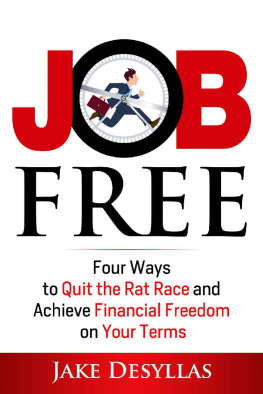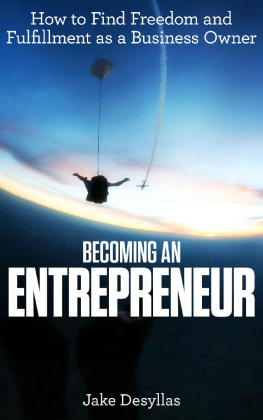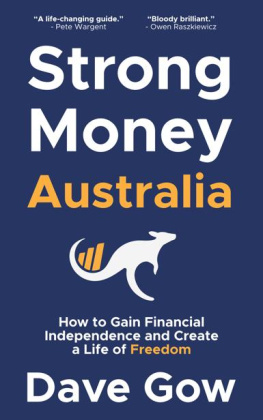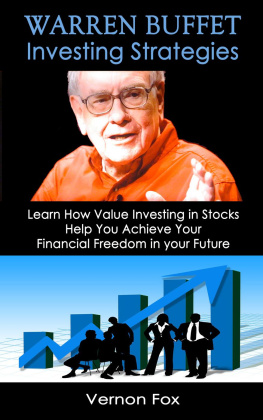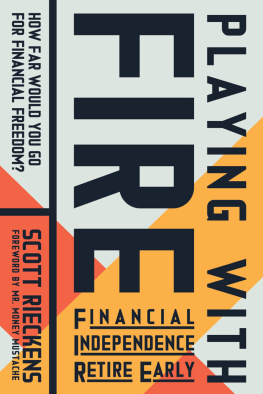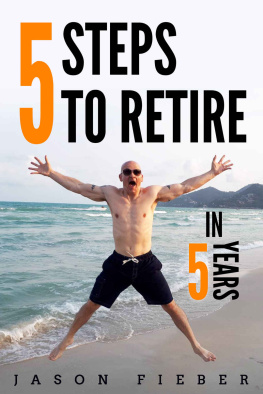Contents
Job Free
Four Ways to Quit the Rat Race and Achieve Financial Freedom on Your Terms
by Jake Desyllas
Introduction
Whoever will be free must make himself free.
Max Stirner
Peters Story
Sometimes a single conversation can change your life, by opening your mind to possibilities never dreamed of. I was lucky to have such a conversation at a young age, quite unexpectedly. It happened when Peter told me how he planned to become a millionaire, retire early, and never work in a job again.
At the age of sixteen, I was trying to make sense of Marxism. My parents were both socialists, and I wanted to be one too. But the more I read about Marxism, the less sense it made. I was asking a lot of questions that my mother couldnt answer. She suggested that I speak to a man called Peter, who had previously been involved in the same political group as her.
When I met Peter, he was in his mid-twenties and I was a teenager. He had a well-paid job in the City, Londons financial center. I visited Peter at his small Greenwich apartment, where he showed me into a room he called his library. Every wall had floor-to-ceiling shelving, stacked full with books.
Peter seemed to have read every important book I had heard of in the fields of philosophy, history, and politics. Whenever I borrowed one of these books in the years to come, I would find pages of his neatly written notes tucked inside the covers. He formed his own theories and viewpoints about everything he read, but he was unconcerned about publishing any of his ideas.
Peter was not a typical city worker. His favorite character from literature was Sherlock Holmes, whose demeanor he obviously emulatedhe even smoked a pipe. He rarely socialized and was awkward around strangers, especially women. His favorite activity was discussing philosophy in an armchair in his library, with a glass of whiskey, surrounded by a fog of pipe smoke.
Peter had suffered an extremely harsh childhood in poverty. He was an orphan, adopted by violently abusive parents. His adoptive parents were ignorant and did not value education, but he had nonetheless succeeded in getting into Cambridge, one of the most exclusive universities in the country.
Over many late nights, many cigarettes for me, and many pipe refills for Peter, I questioned him about Marxism. Rather than defend his former ideology, Peter recognized fallacies in the arguments. He frankly acknowledged that ideas he had previously advocated were not just fallacious, but also incredibly destructive. As a result of our discussions, he abandoned Marxism once and for all, and I gave up on the idea of becoming a convert. We became good friends.
A couple of years after we met, Peter and I had the conversation that changed my life. By this time, Peter had left his city job and set up his own business. I learned a huge amount about entrepreneurship by talking to him about his venture. One night, sitting in his flat in Greenwich, I asked Peter what his goals in life were.
Peter told me that his goal was to become a millionaire and retire early. He intended to work extremely hard, create a profitable business, and make his fortune. As he spoke, I was impressed by his seriousness. He wasnt just dreaming about becoming a millionaire; he was planning it. I had never heard anyone admit to having such an ambitious life plan.
Everything Peter planned to do, he would accomplish through his own efforts. There are many opportunities for highly intelligent people like Peter to move into comfortable, protected jobs where they can live largely at everyone elses expense. My university professors provided examples of this lifestyle. In contrast, Peter was the most enterprising person Id ever met. He would never compromise his ideas to fit into a cushy government job or to get grant money as an academic. He would build his own fortune and tell the world where to stick it.
Peter told me he planned to quit the rat race once he had reached a net worth of 1 million. He believed in his ability to become a multimillionaire, but he didnt see any point in having such a goal. He calculated that a million would be enough money to give him the freedom to do whatever he wanted, which would probably be mostly reading, coming up with theories, and smoking his pipe in his armchair.
This part of his plan also left a deep impression on me. Peter was planning to change course radically. He intended to become a success in his chosen career and then simply quit and do something else. Everyone else I knew was working to find belonging and acceptance within some group. Peter didnt seem to care at all what others thought of him. He was making goals based on what would bring him personal fulfillment.
At the time, I was still trying to find a place for myself in the working world. I had never met anyone who planned to drop out of his career and redesign life on his own terms. Of course, I had met many people whose circumstances had forced them to find new ways to make ends meet, when they lost a job or were unsuccessful. But Id never met someone planning to be a successful dropout.
Peter knew that it was up to him to create a great life for himself, regardless of his background. He saw it as his responsibility to realize the full potential of his character and to make the circumstances of his birth irrelevant. This attitude inspired me.
Our paths in life eventually diverged, as I will explain later. Nonetheless, Peter taught me what it means to take ownership of your life. He showed me what it means to free yourself. His example also suggested a time frame to accomplish financial independence: Peter was on track to reach early retirement some time in his mid-thirties.
About Me
That pivotal conversation with Peter was my first introduction to the idea of living a job-free life. I stopped thinking about how to find a good job and started thinking about how I could create the kind of life in which I didnt need one. Peter gave me encouragement and guidance, and he lent me money when I wanted to start my own business. I found my path to job freedom through entrepreneurship, when I founded a startup in 2000 called Intelligent Space.
Intelligent Space was a pedestrian movement consultancy. We advised architects, engineers, and developers on how to create better environments for pedestrians. We developed computer simulations that mapped where people are likely to walk, which is often not the same as where architects or engineers think they should walk.
I found the experience of building a business deeply fulfilling, even when it was stressful. Being my own boss was awesome. I slowly grew the business, and (with many missteps along the way) eventually achieved a high level of profitability. I wrote about the founding and growth of my business in my book, Becoming an Entrepreneur.
From talking with Peter, I learned another way to think about the purpose of money. Money can buy freedom rather than comforts. You can use money to change your life, rather than let it control your life. Money can be a tool of personal liberation.
I achieved financial independence at the age of 35. I was able to do so because I sold my business to a large engineering company. I stayed on, working as a director for the company for three years, helping to integrate my business into their operation. At the end of that earn-out period, in 2010, I retired early at the age of 38.
Since I sold my business, my priority in life has been freedom. I have arranged my consumption habits and financial life around the goal of giving myself the freedom to do whatever I want with my day. I treasure never having to work on anything that I dont want to. I now live from passive investments as a private investor. I spend my time only on projects and activities that I feel enthusiastic about.

